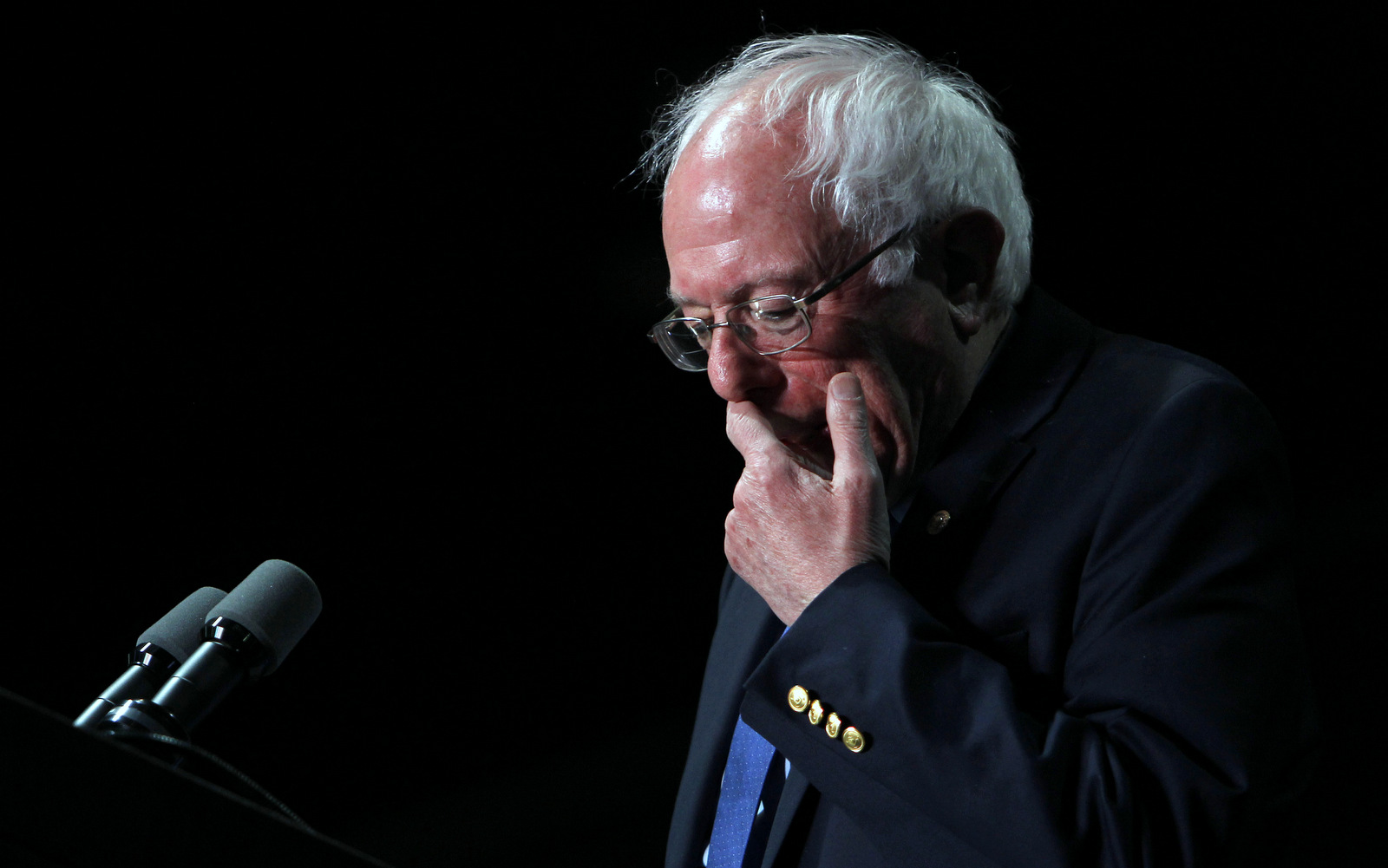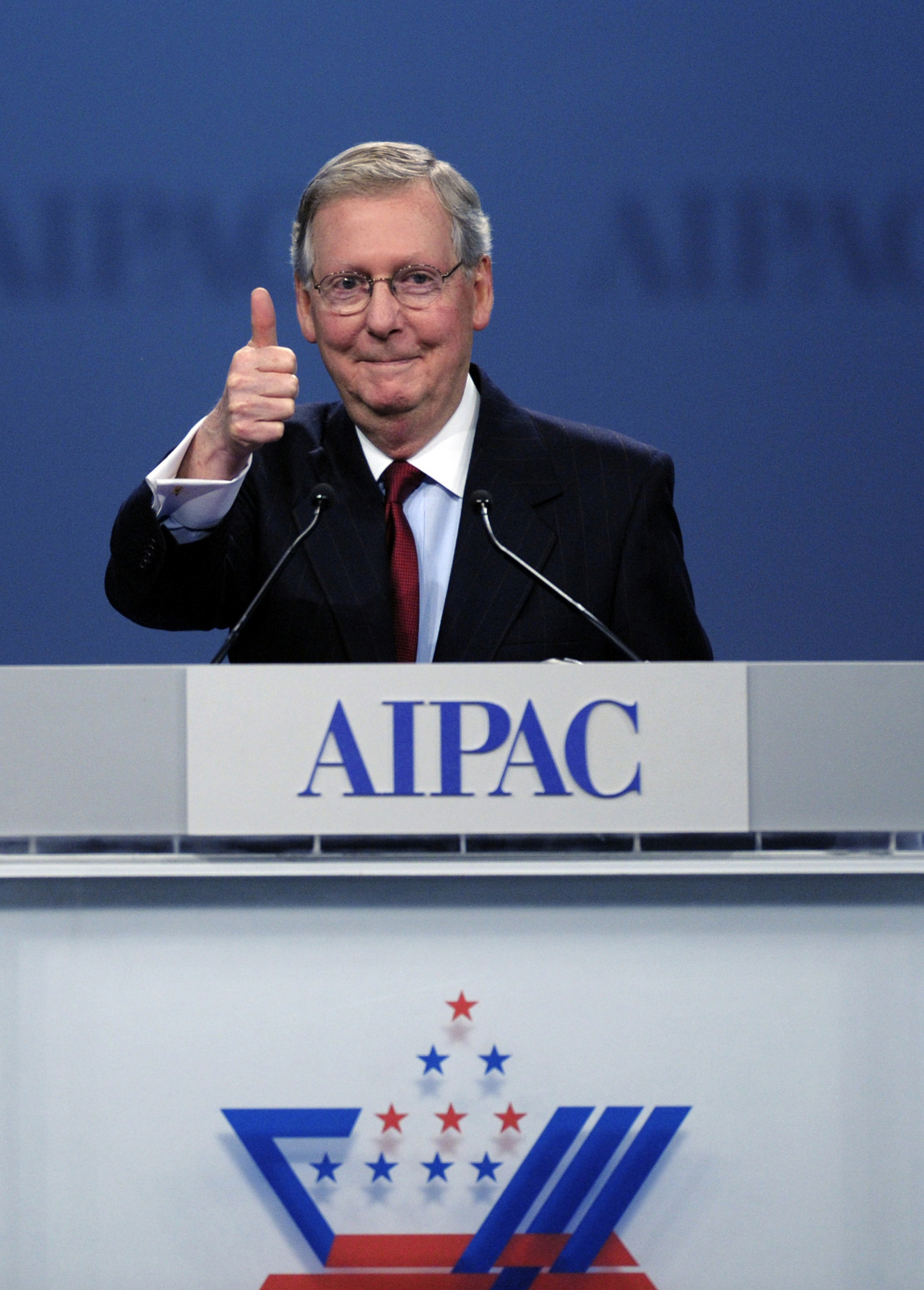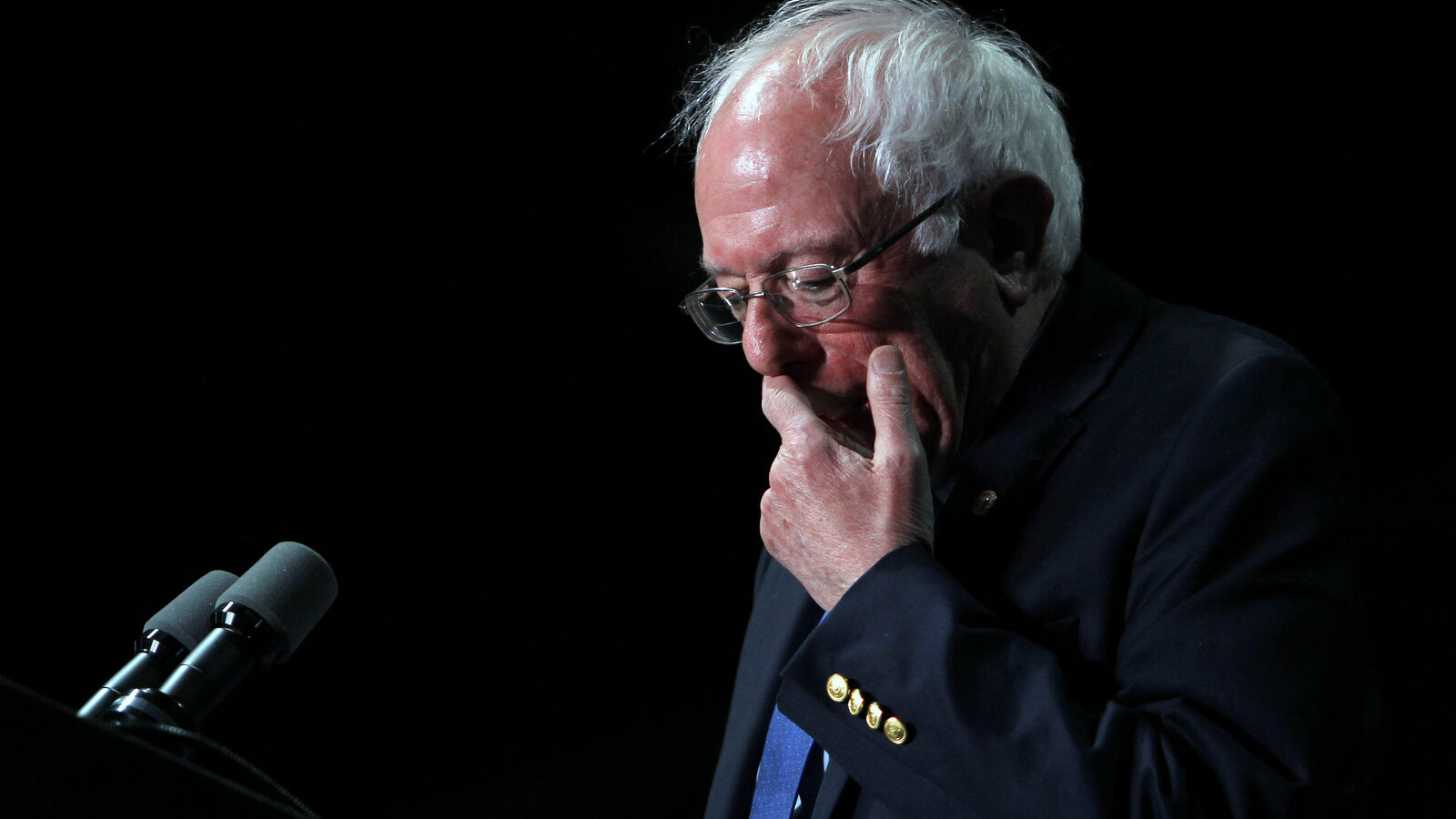
SEATTLE — (Analysis) The annual American Israel Public Affairs Committee policy conference opens on March 20 in Washington, and a recent petition campaign is calling on one particular candidate to skip the event, which more or less requires candidates to kowtow to the Israel lobby — something other candidates have proven eager to do.
This event is the largest grassroots lobbying gathering of its kind in the nation, and it takes on particular importance in a presidential election year. It gives candidates an opportunity to show off their pro-Israel credentials, and it gives AIPAC an opportunity to flaunt its power by showing the most powerful politicians in the nation coming to pay their respects.
This year, the conference offers both drama and a dilemma for several candidates. It’s not surprising that Hillary Clinton has already accepted her invitation. Thanks to her most important donor, Israeli-American entertainment mogul Haim Saban, AIPAC is a command performance.
But with the other candidates it’s a bit of a crapshoot. For example, the last time Donald Trump spoke before a similar audience, the Republican Jewish Coalition at Sheldon Adelson’s Las Vegas casino, the current GOP frontrunner rattled the nerves of the pro-Israel audience. He told them that he wanted the United States to play an even-handed role in the Israel-Palestine conflict. For Zionists, whose political ear is exceedingly short on subtlety, “even-handed” means insufficiently supportive of Israel. His refusal to promise to move the U.S. embassy from Tel Aviv to Jerusalem, one of AIPAC’s pet projects, threw pro-Israel Republicans into a quandary, since it’s unprecedented for a Republican presidential candidate to “leave the reservation” in such bold and brazen fashion.
Watch Trump to Jewish group: I’m a negotiator like you:
But Bernie Sanders faces perhaps the biggest test because his own policy on Israel-Palestine, as with his entire foreign policy platform, is so vague and undeveloped. The candidate has two major Achilles heels with his progressive audience: gun control and Israel-Palestine. Considering how bold, even radical, many of his policy provisions are, including criminal justice reform, health care, and economic inequality, it’s surprising that his views on the Middle East are so conventional and centrist.
Sanders offered this two-state pablum in a 2013 Playboy interview:
“The hatred, violence and loss of life that define this conflict make living an ordinary life a constant struggle for both peoples. We must work with those Israeli and Palestinian leaders who are committed to peace, security and statehood rather than to empty rhetoric and violence. A two-state solution must include compromises from both sides to achieve a fair and lasting peace in the region. The Palestinians must fulfill their responsibilities to end terrorism against Israel and recognize Israel’s right to exist. In return, the Israelis must end their policy of targeted killings, prevent further Israeli settlements on Palestinian land and prevent the destruction of Palestinian homes, businesses and infrastructure.”
This is the sort of milquetoast statement any liberal could’ve delivered in 1990, 2000, or 2010. But times have changed. The situation has grown far worse. One side has shown willingness to compromise, while the other has offered only rhetoric — and precious little of it. Yet Sanders’ rhetoric remains mired in a distant past when there was some hope that these “compromises” were possible.
Why Bernie is not progressive on Palestine
There are several important things to understand about Sanders: He is primarily interested in domestic policy, and insofar as he has a foreign policy approach, it’s a conventional liberal Democratic one — opposition to U.S. interventionism and overuse of military force.
Because the Israel-Palestine conflict is so complex, so intractable, and because it has caused many other presidents to throw up their hands in defeat, Sanders prefers not to run his campaign (or his presidency, should he be elected) aground between Scylla and Charybdis. So he mouths the standard liberal Zionist platitudes of a two-state solution and ending illegal Israeli settlements. He adds that he seeks justice for Israelis and Palestinians and an end to suffering on both sides. That and a few bucks will get you a cup of coffee.
Such vagueness and timidity drives pro-Palestine activists and scholars like Steven Salaita crazy. That’s why he wrote “I Won’t Vote for Bernie Sanders,” a piece excoriating the candidate for a foreign policy approach both out of date and out of sync with his progressive base.
Salaita argued:
“Until Sanders states an intention to defund Israel’s occupation, his proclamations about two states will continue to sound perfunctory and disingenuous, dull bromides uttered by a man who otherwise avoids them. And Palestinians will continue to exist as dispensable abstractions in American election drama.”
Sanders’ timid Middle East policy is too liberal for AIPAC
Though the pro-Israel group makes a point of claiming to be bipartisan, it tilts decidedly Republican. AIPAC also has a history of supporting Likudist governments far more effusively than Labor governments. That means that even Sanders’ timid approach of a two-state solution will be anathema to the AIPAC crowd.

To give a speech to the policy conference one must follow a checklist which includes affirming an unshakable U.S. commitment to Israel’s military superiority, expanding military-intelligence cooperation, standing tall against Islamist extremism, and supporting the people of Israel against the terrorist threat.
Even a moderate (on this issue, at least) like Sanders would choke on some of these demands. They go against every bone in his political body. So what could he say to AIPAC? Very little that would permit him to retain his self-respect and leave his audience at all satisfied.
That’s why Robert Naiman’s Dear Bernie letter in Truthout seems especially naive. In his article, he urges the candidate to use AIPAC to speak truth to power:
“Bernie Sanders could use this opportunity to be a truth-teller to AIPAC. …
Bernie has called for a ‘level playing field’ in US policy towards Israel and the Palestinians, and has called for Israel to ‘end the blockade of Gaza, and cease developing settlements on Palestinian land.’
Calling for a ‘level playing field’ in US policy towards Israel and the Palestinians is a completely reasonable thing for Bernie to say.”
What is reasonable is in the eyes of the beholder. Calling for a level playing field, and an end to settlements and the Gaza siege at a Congressional press conference is one thing. Doing it before 5,000 pro-Israel red meat, true believers is quite another. Sanders would certainly be booed. Whether he would be permitted even to finish his speech is an open question. What’s for certain is that he would be dead meat as far as the Israel lobby is concerned. That means that they would attempt to sabotage his entire political agenda, as well as his Israel-Palestine agenda.
For Sanders to speak to AIPAC is lose-lose proposition
But can he refuse, as Max Blumenthal urges in a petition campaign he launched which has amassed over 4,000 signatures? Alternet further lays out the case for Sanders to turn his back on the lobby.
No doubt, refusing to attend would be the sort of bold and courageous move that Sanders is known for. He recently told the mayor of Chicago, Rahm Emanuel, he could take his endorsement of Hillary Clinton and shove it:
“‘Hillary Clinton proudly lists Mayor Rahm Emanuel as one of her leading mayoral endorsers,’ Mr. Sanders said. ‘Well let me be as clear as I can be: based on his disastrous record as mayor of the city of Chicago, I do not want Mayor Emanuel’s endorsement if I win the Democratic nomination.’”
That’s the sort of moral clarity for which his admirers love him.
Watch: Bernie Sanders town hall gives US party line when confronted re: #gaza:
But in defending Israel’s murderous incursions into Gaza, which have cost the lives of thousands of civilians, Sanders has shown little of that moral clarity. In the infamous Vermont town hall video, in which he tells one of his constituents to “shut up” when the questioning gets heated, he displays all of the false moral equivalences of typical liberal Zionist thought. Here’s how a reporter for Bustle described the interaction, in which the questioner asked Sanders about his views on Israel’s bombing of U.N. schools, which killed scores of sheltering civilians:
“… [As] Sanders explained his view — he claimed that Israel ‘overreacted’ and wrongly bombed U.N. facilities, but the country was also faced with Hamas-fired rockets shot from populated areas — he was met with an angry interruption. Before you know it, he was yelling ‘shut up,’ and a woman in the back of the room was yelling ‘F**k Israel!’ It was ugly.”
If Sanders rejects AIPAC, that would resonate with his left-wing base. In doing so, however, he could endanger his domestic policy agenda because he would alienate at least a portion of the liberal Democrats he feels he needs to advance his main priorities.
This leaves Sanders with a major dilemma: speak to AIPAC in benign platitudes which will alienate the least number of its supporters while falling far short of his own progressive values, or turn his back on the invitation and earn the enduring wrath of the Israel lobby?
In some sense, this is precisely the sort of predicament AIPAC wants him to face. The group has been pursuing its agenda for 60 years and it is nothing if not practiced in the art of putting politicians’ backs to the wall in support of Israel.
In AIPAC’s view, there is only one satisfactory posture for a U.S. politician: supplicant on bended knee. There are no compromises when it comes to Israel. You’re not with the lobby one day and permitted to vote your conscience the next. The national policy conference is meant to be the pro-Israel equivalent of the “come-to-Jesus” moment. I don’t envy Sanders the choice he will have to make: will he or won’t he?
American Jewish Leaders Increasingly Angry over Aipac’s Invitation to Trump
Aipac itself faces an increasing dilemma over its invitation to Trump to speak at the conference. He, of course, is delighted to burnish his credentials in the Jewish community, a constituency in which he has almost no friends (except for Sheldon Adelson, apparently). But an enormous conflagration has erupted among mainstream Jewish organizations which have roundly, and almost universally condemned the move. The editor of the Los Angeles Jewish Journal wrote: “By giving Trump a platform without taking a stand on outright hate speech, AIPAC is helping to fuel this discord. That’s the core moral mistake AIPAC is making.” Haaretz contributor, Peter Beinart, asked pointedly if Aipac would invite a presidential candidate who urged banning Jews from entering the U.S. While the Reform movement, the most liberal of Jewish denominations, did not condemn the invitation outright, it made its opposition clear:
“Jewish history is replete with times when political leaders, both at home and abroad, demonized the Jewish community much as Mr. Trump now demonizes Muslims, Hispanics, and African-Americans. We, the leadership of the Reform Jewish Movement, believe we must speak up against such hate speech…”


